
May 31, 2024 | CIRC News, Community Engagement News, Dr. Beverly Wright News, DSCEJ General News, Newsletter News, Research and Policy News, Student Engagement News, The Latest News, Worker Training Program News
SPRING 2024 EDITION:
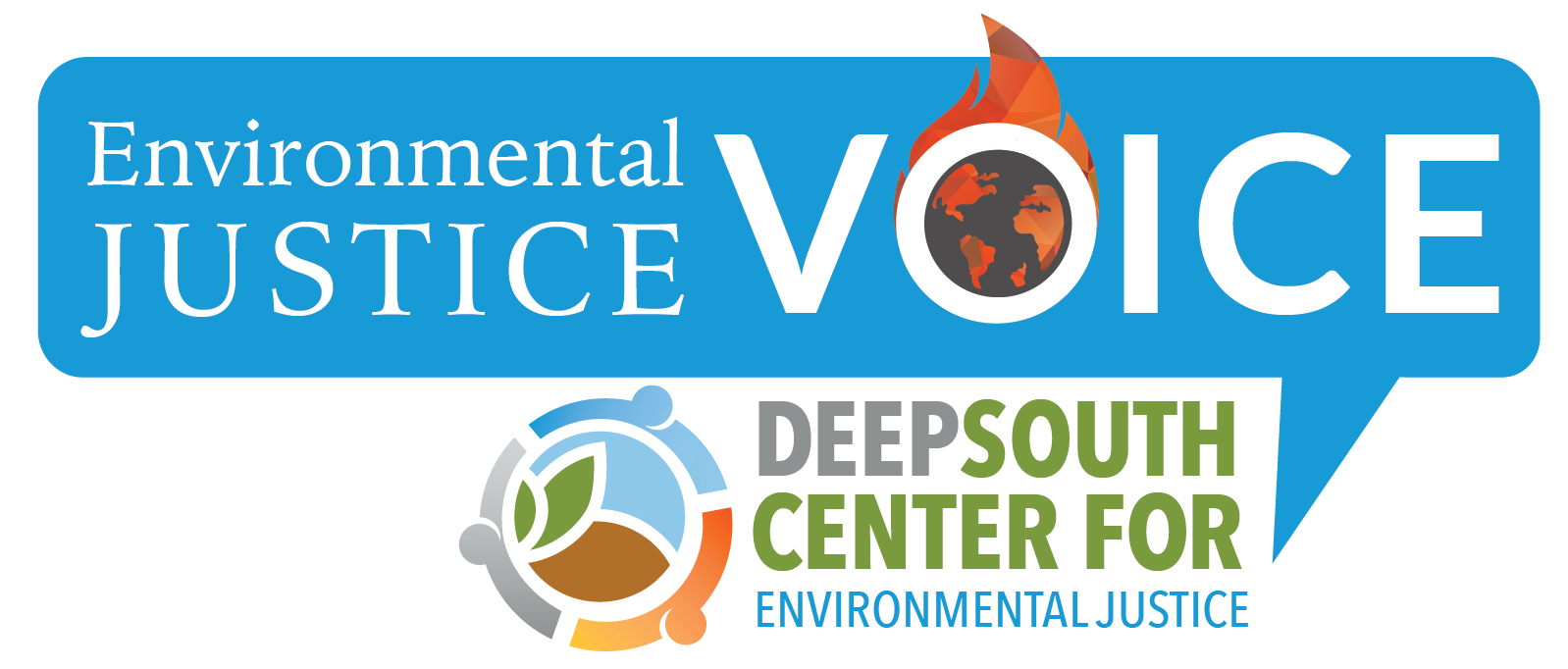
Read Our Spring Newsletter
IN THIS EDITION:
- Worker Training Program Graduation
- Justice40 – Celebrating our Success
- Community Investment Recovery Center (CIRC)
- Earth Day 2024
- Carbon Dioxide Waste Injection – Louisiana Deserves Better!
- SPRING HIGHLIGHTS
- Travelogue: Dr. Wright
- Team DSCEJ UPDATE
READ MORE . . .
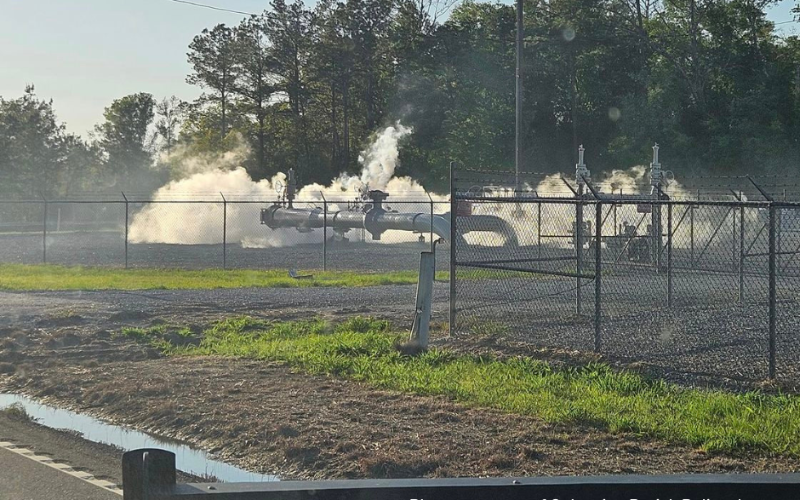
Apr 4, 2024 | Community Engagement News, DSCEJ General News, Research and Policy News
From Louisiana Against False Solutions
Emergency Plans Are Not in Place for Residents’ Safety
Sulphur, Louisiana — Last night, there was a leak in a high-pressure carbon dioxide (CO2) pipeline owned by Denbury Inc. and ExxonMobil, in Sulphur, Louisiana. Pipeline operator representatives arrived at the scene almost two hours after Calcasieu Parish’s Ward 6 Fire Department. This pipeline is just one of a multitude of proposed CO2 pipelines that threaten Louisiana communities as part of a rapid build-out of the dangerous carbon capture and storage (CCS) industry. Carbon dioxide displaces oxygen and can cause asphyxiation in high concentrations, yet sufficient safety and emergency preparedness plans are not in place in communities that are located near dangerous pipelines.
James Hiatt, a resident of Calcasieu Parish and Executive Director of For a Better Bayou, said, “Last night’s carbon dioxide (CO2) leak from an ExxonMobil-owned pipeline in North Sulphur reiterates grave concerns about carbon capture and storage infrastructure’s safety. Coupled with a previous serious incident in Satartia, Mississippi, which necessitated evacuations and medical treatments due to a similar pipeline failure, these events underscore the perils tied to handling and moving CO2 in large volumes.”
“This wasn’t the first incident at the North Sulphur site, highlighting a troubling pattern of safety lapses,” Hiatt continued. “Given the proposals for extensive new CO2 pipelines across South Louisiana, these repeated incidents serve as a stark warning. It’s crucial that these risks not be ignored or minimized, especially when the stakes for public safety and health are so high.”
When firefighters arrived at the scene, a high-pressure leak of carbon dioxide was discovered at the pumping station. A shelter-in-place was issued by the Calcasieu Police Jury for residents within 1/4 miles of the incident. Despite carbon dioxide’s tendency to travel at ground level, no warning was given to residents to seek higher ground in their homes. The shelter-in-place was lifted at 9:15 p.m. when the readings suggested the area was clear.
“This pipeline represents just a small fraction of the massive number of CO2 pipelines that are proposed to slice through our communities in Louisiana,” said Breon Robinson, organizer with Healthy Gulf. “If we’re already having these dangerous incidents such as last night with existing CCS infrastructure, we must pump the breaks on this industry before we subject even more people to even more danger.”
Roishetta Sibley Ozane, founder and CEO of The Vessel Project of Louisiana, said, “I never imagined that my own home in Sulphur, Louisiana, would become a dangerous place to be due to a CO2 leak, but I’m not surprised. As an environmental justice leader, I have been fighting against the constant threat of new fossil fuel buildout in our community, including the newly proposed false solutions of carbon capture. This CO2 leak was a stark reminder of the environmental injustices we face daily.”
“Sheltering in place became not only a matter of personal safety but also a symbol of our ongoing struggle,” Ozane continued. “We were not only dealing with the immediate danger of the leak but also the long-term impacts of living in an area heavily burdened by industrial pollution. It felt like we were trapped, both physically and metaphorically, as the very air we breathed posed a threat to our health.”
This morning, the Louisiana House Committee on Natural Resources and Environment was hearing a discussion on two bills on carbon capture and storage. The bills, HB 289 and HB 398, respectively, are related to whether carbon dioxide injection wells should be permitted in certain areas. One of the bills specifically included a provision on emergency response — an area that lawmakers are grappling with as dozens of carbon capture projects and pipelines are proposed across Louisiana.
Monique Harden, Director of Law and Public Policy at the Deep South Center for Environmental Justice, said, “Industrial releases of carbon dioxide not only warm the planet but are also hazardous to communities. We can expect more CO2 disasters in communities with plans for more and more gas plants, CO2 pipelines, and underground injection of CO2 waste. The only effective protection is a transition away from dirty energy that ensures environmental justice.”
“Southwest Louisiana is once again the victim of two realities,” said KD Minor, Founder of Forever Calcasieu and Community Solutions Coordinator at the Alliance for Affordable Energy. “While the White House announces billions of dollars in industry investments, the people still recovering from record-breaking hurricanes are now faced with sheltering in place for toxic emissions from those same industries. It is long past time that we put our priorities in the people that make this state great, and begin our transition away from the practices that continue to decrease the quality of our lives.”
###
Media Contacts:
Eloise Reid, LAFS Manager
504-249-8748
eloisereid@gmail.com
Stephannie Kettle, Healthy Gulf Communications Manager
407-361-9432
skettle@healthygulf.org
Louisiana Against False Solutions (LAFS) is a coalition of more than 20 organizations leading in Louisiana and nationally for environmental, racial, and social justice. LAFS includes expertise across a range of disciplines: law, environmental science, geology, steel and materials scientists, traditional and Indigenous knowledge-holders, experienced campaigners, fisherfolk, and frontline communities. Learn more at https://www.lagainstfalsesolutions.org
The Deep South Center for Environmental Justice is a member of the LAFS Coalition.

Oct 13, 2023 | Community Engagement News, DSCEJ General News, HBCU Climate Change Conference News, Student Engagement News
Oct 13, 2023
Community Forum Kicks Off Four-Day Event Bringing HBCU Students, Professors, Advocates, Policy Leaders to New Orleans
NEW ORLEANS, LA – This week, the Deep South Center for Environmental Justice (DSCEJ) and Robert D. Bullard Center for Environmental and Climate Justice kicked off its ninth annual HBCU Climate Change in New Orleans, LA by hosting the “It’s About Justice” community forum. The solution-oriented dialogue centered around the urgency of addressing environmental injustices. A keynote speech by Minnesota Attorney General Keith Ellison on criminal, racial, and environmental justice followed the Forum. The event wrapped up with a reception and book signing session, during which Keith Ellison autographed his book “Break the Wheel: Ending the Cycle of Police Violence,” Heather McTeer Toney, Executive Director of the Beyond Petrochemicals Campaign, signed copies of her book “Before the Street Lights Come On: Black America’s Urgent Call for Climate Solutions,” and Dr. Robert Bullard and Dr. Beverly Wright added their signatures to their collaborative work, “The Wrong Complexion for Protection: How the Government Response to Disaster Endangers African American Communities.”
This year’s conference theme is Looking Back to Move Forward: Building a Climate Resilient Future for Vulnerable Communities. Attendees will address issues related to climate justice and resilience, like transportation, energy sources, carbon emissions, green jobs, the creation of a green economy, and community economic development.
“The HBCU Climate Change Conference has been a major focus of our work for the last decade as we seek to train and influence the next generation of environmental justice leaders. We belive that HBCUs are the frontline for innovative thinking to solve the greatest crisis of our time,” said Dr. Beverly Wright, founder and executive director of the Deep South Center for Environmental Justice. “This is an opportunity to bring together Black faculty, students, policy experts and researchers together to bridge the gap between actionable solutions and theory to provide solutions that will have a tangible impact on our communities.”
“It was a magic moment to share the book signing stage with some fantastic authors who not only research, meticulously document and write books about the struggle of Black people, but more important were the change agents themselves in frontline communities quest for environmental, climate, economic, racial justice in policing,” said Dr. Robert D. Bullard, Director of the Bullard Center for Environmental and Climate Justice at Texas Southern University and Co-Chair of the HBCU Climate Change Consortium. “And like our HBCU Conference, its all about justice.”
“Climate justice must be seen as part of, and not distinct from, racial justice,” said Minnesota Attorney General Keith Ellison. “The impacts of climate change won’t be felt evenly – Black, brown, and Indigenous communities will be hurt first and worst. We have to be our own salvation, and use the tools at our disposal to move us forward.”
Other notable speakers scheduled throughout the conference include Chair Brenda Mallory of the White House Council on Environmental Quality, Tennessee State Representative Justin Pearson, Rev. Lennox Yearwood of the HipHop Caucus, Dr. Mithika Mwenda of Pan African Climate Justice Alliance, and Dr. Calvin Mackie of STEM NOLA among other scholars, students, advocates, and experts.
###
About the Deep South Center for Environmental Justice
Families in the Gulf Coast deserve to live in communities that are free from deadly air and are more resilient to climate change and extreme weather. The Deep South Center for Environmental Justice (DSCEJ) works to empower and engage communities to put environmental justice and equity at the center of all climate action. Led by environmental justice scholar and advocate, author, civic leader, and professor of Sociology Dr. Beverly L. Wright, the DSCEJ uses research, education, and community and student engagement to advocate for policy change, lead health and safety training for environmental careers, develop social and emotional community wellness programs, and create new and environmentally healthy opportunities for the residents of communities disproportionately impacted by historic environmental injustice.
About Bullard Center for Environmental and Climate Justice
The Bullard Center for Environmental and Climate Justice at Texas Southern University addresses longstanding issues of systemic inequality and structural racism that cause disproportionate pain, suffering and death in Black and other people of color communities. The Center is directed by environmental justice scholar Dr. Robert D. Bullard and is housed in the Barbara Jordan-Mickey Leland School of Public Affairs. It strives to be a leading force for transformative environmental, climate and racial justice using rigorous science, community-driven research, policy, civic engagement programming, and effective advocacy.
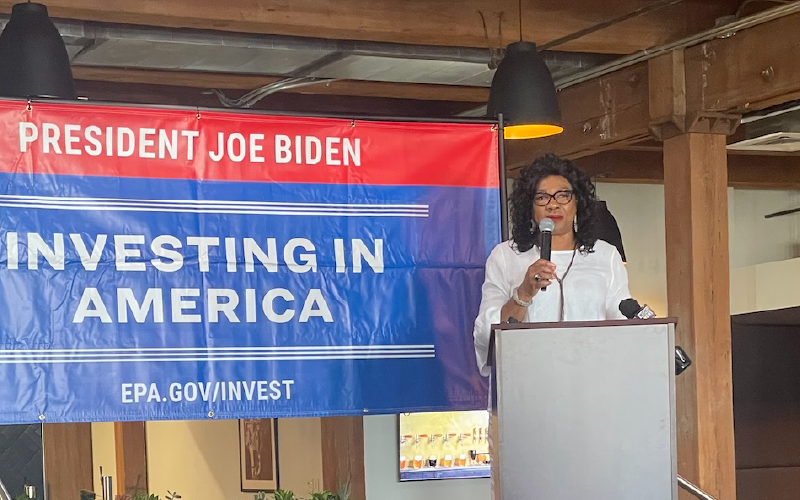
Aug 14, 2023 | CIRC News, Community Engagement News, DSCEJ General News, Funding News
Aug 14, 2023
NEW ORLEANS, LA (August 14, 2023) – Today, the U.S. Environmental Protection Agency (EPA), members of Congress, and other elected officials celebrated a $13 million grant over five years to the Deep South Center for Environmental Justice (DSCEJ). The DSCEJ is among 16 entities selected nationally through a partnership between EPA and the U.S. Department of Energy to house Environmental Justice Thriving Communities Technical Assistance Centers (EJ TCTACs) and receive a total of $177 million in grant funding. The grants will help underserved and overburdened communities across the country access funds from President Biden’s Investing in America agenda for a variety of activities to advance environmental justice (EJ).
“Almost one year ago on September 24, 2022, Administrator Regan alongside EJ and civil rights leaders in Warren County, North Carolina – the site of protests 40 years ago that launched the EJ movement – announced the establishment of the Office of Environmental Justice and Civil Rights,” said Acting EPA Region 4 Administrator Jeaneanne Gettle. “Today, in partnership with Region 6 and in direct response to feedback from communities, EJ leaders and their partners, I would like to congratulate the DSCEJ for being one of just 16 entities selected nationwide to aid communities throughout the U.S.”
“The Deep South Center for Environmental Justice has accomplished so much since its inception—including building local community capacity to address environmental justice challenges and routinely assisting communities who lack access to federal funding. Their work raises awareness about frontline communities that deserve protection from disproportionate pollution and climate change,” said Region 6 Deputy Regional Administrator Stacey Dwyer. “This grant and the creation of this hub represent a step forward in realizing a dream for Gulf Coast Region families to thrive through clean air, water and energy. I would like to extend my gratitude to the Deep South Center for their innovative work in improving the lives of residents in Louisiana and along the Gulf Coast.”
“We are thrilled to receive this grant and to be selected as one of only 16 Environmental Justice Thriving Communities Technical Assistance Centers in the country by the EPA and the Department of Energy,” said Dr. Beverly Wright, Executive Director of DSCEJ. “President Biden’s historic investments in environmental justice are a result of decades of advocacy by communities like ours in the Deep South and across the country. We are proud to be part of this effort, and look forward to helping break down these barriers to help our communities access the federal resources available to them so our children can grow up in an environment free from the dangers of pollution.”
“I’m fighting to ensure federal investments flow to underserved communities that will foster environmental justice in Louisiana’s Second Congressional District. I proudly voted for the Bipartisan Infrastructure Law that made this funding a reality. As one of the sixteen esteemed organizations selected nationwide to host TCTACs, DSCEJ will be critical in advancing environmental justice and sustainable development. This will be more than just a center – it will be a beacon of hope, a catalyst for change, and a hub of expertise. This investment will facilitate knowledge-sharing and collaborative initiatives that empower our community to drive sustainability forward. By addressing environmental justice challenges, we are working towards a world where all Louisianans can flourish,” said Congressman Troy A. Carter, Sr. (LA-02).
“Underserved communities across Florida have long borne the brunt of environmental inequities and lacked the tools needed to overcome these challenges,” said Congresswoman Sheila Cherfilus-McCormick (FL-20). “Thanks to the leadership of President Biden, this expansive network of assistance centers will remain a fundamental resource and serve communities that are most in need of support.”
“As a strong advocate for environmental justice, I am pleased to see the EPA’s announcement of a significant $130 million grant to the Deep South Center for Environmental Justice. This funding under the Biden-Harris Administration’s Investing in America Agenda will undoubtedly play a crucial role in empowering communities across Mississippi’s 2nd Congressional District to access historic resources aimed at addressing environmental disparities,” said Congressman Bennie Thompson (MS-2). “This investment reaffirms our commitment to addressing environmental injustices in our communities and ensuring that all residents have equal opportunities to live in healthy environments. I commend the EPA for their efforts and look forward to collaborating with the Deep South Center for Environmental Justice to achieve a more equitable and sustainable future.”
DSCEJ will receive $13 million over five years to remove barriers and improve accessibility for communities with environmental justice concerns. Their goals include building organizational capacity of at least 250 Community-Based Organizations (CBO) in underserved communities in Regions 4 and 6 in areas such as research and community engagement; assist CBOs in applying for $50-100 million in grants over the five-year performance period; and scale up the reach and impact of their new Community Investment and Recovery Center to sustain capacity-building services for the long term.
EPA will deliver these resources in collaboration with the U.S. Department of Energy, whose funding allows the EJ TCTACs to provide support for identifying community opportunities for clean energy transition and financing options, including public-private partnerships supporting clean energy demonstration, deployment, workforce development and outreach opportunities that advance energy justice objectives.
The formation of the EJ TCTACs is in direct response to feedback from communities and environmental justice leaders who have long called for technical assistance and capacity-building support for communities and their partners as they work to access critical federal resources. The 16 centers will provide comprehensive coverage for the entire United States through a network of over 160 partners, including community-based organizations, additional academic institutions, and Environmental Finance Centers so that more communities can access federal funding opportunities like those made available through President Biden’s Inflation Reduction Act and Bipartisan Infrastructure Law.
The EJ TCTAC program is part of the Federal Interagency Thriving Communities Network and delivers on the Biden-Harris Administration’s Justice40 Initiative to ensure that 40% of the benefits of certain federal investments flow to disadvantaged communities. The new technical assistance centers will help ensure communities with environmental justice concerns can access President Biden’s historic investments in America to address generational disinvestment, legacy pollution, infrastructure challenges, and build a clean energy economy that will lower energy costs, strengthen our energy security, and meet our climate goals.
Learn more about the selectees, their partners and the EJ TCTAC program.
Learn more about environmental justice at EPA.
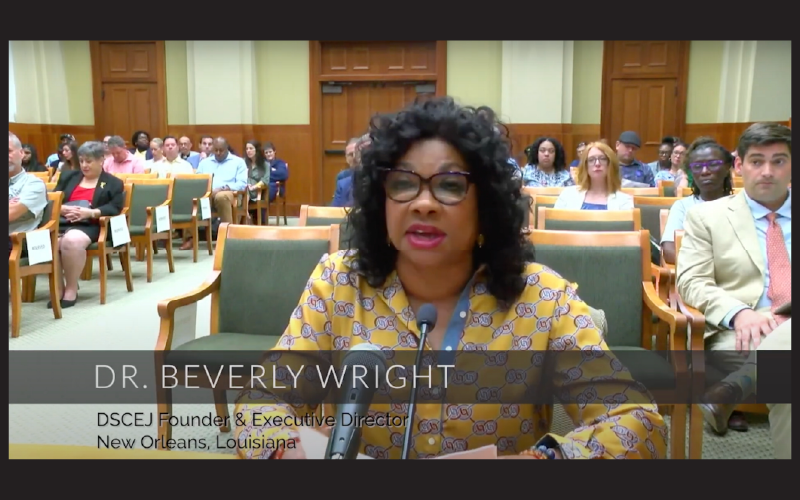
Jun 22, 2023 | Community Engagement News, Dr. Beverly Wright News, DSCEJ General News, Research and Policy News
Deep South Center for Environmental Justice Testifies at EPA’s Public Hearing on Louisiana’s Carbon Capture & Sequestration Program
FOR IMMEDIATE RELEASE: June 22, 2023
Contact: Ginger LeBlanc | gingerl@dscej.org
New Orleans, LA – Yesterday, Dr. Beverly Wright, Executive Director of the Deep South Center for Environmental Justice (DSCEJ), joined environmental justice activists and local community leaders in Baton Rouge to testify in opposition to the Environmental Protection Agency’s (EPA) proposed approval of Louisiana’s Carbon Capture & Sequestration (CCS) Program during the agencies’ three-day public hearing.
The EPA’s public hearing comes at a time when a new wave of gas-burning facilities is being proposed in Louisiana communities where the majority of residents are Black, Indigenous, and poor. Plans for many of these facilities include carbon capture and storage or CCS – a risky process that involves collecting carbon dioxide from industrial waste streams and transporting it via miles of pipeline to areas designated for injecting the carbon dioxide underground for permanent disposal.
Last week, the Louisiana legislature attempted to tackle problems in state laws governing carbon dioxide waste injection. One of these laws significantly reduced the time of a company’s liability for operating a carbon dioxide injection well from 50 years, which is required by federal regulations, to 10 years. The recent changes to the state laws trigger another review by the EPA with the opportunity for public notice and comment.
“Today’s hearing by the EPA is more than whether DNR should have this permitting authority over the Class VI Underground Injection Control Program, it’s about our future,” said Dr. Beverly Wright, Founder and Executive Director of the Deep South Center for Environmental Justice. “Who wants a future that repeats the past of leaking and broken-down oil and gas wells that are abandoned by companies? This is what we have with state laws that place the burden on the people of Louisiana to pay for and remedy the damage that occurs from carbon dioxide injection wells, and allow companies to walk away from the liabilities imposed by federal regulations.”
DSCEJ also provided the EPA with critical information about the state’s proposed program and the risks of CCS:
With a record of failure and mismanagement that resulted in destroying the Bayou Corne community, harming children and adults in Grand Bois, and leaving the state littered with leaking oil and gas wells, the Louisiana Department of Natural Resources (DNR) submitted a flawed application for authority to permit underground injection of carbon dioxide (CO2) that is collected from the waste stream of industrial facilities.
1. Carbon dioxide is hazardous
- The National Institutes of Health (NIH) reports carbon dioxide is an asphyxiant and toxicant. Carbon dioxide displaces oxygen in the air we need to breathe. High concentrations of carbon dioxide can result in death. Within one minute of CO2 poisoning, a person can pass out and suffer respiratory arrest.
- On February 22, 2020, in Satartia, Mississippi, people were not able to escape a major CO2 release from a pipeline rupture because their cars stalled out due to the clouds of carbon dioxide that displaced oxygen.
2. Carbon dioxide waste injection increases risks
- Carbon dioxide corrosion can break down the metals in pipelines and containers and leak out with the potential for contaminating the environment, including waterways and groundwater sources for drinking water.
- Carbon dioxide can also break down rocks underground and, like an earthquake, cause things to shift above ground. Louisiana has numerous fault lines that increase the potential for earthquake incidents occurring from carbon waste injection.
- Abandoned oil and unplugged gas wells can serve as straws for carbon dioxide to move upward to the atmosphere and increase climate risks, which defeats the entire purpose for carbon capture and storage or CCS.
3. Oil and gas companies lobbied to shift liability for damages caused by carbon dioxide waste injection to the people of Louisiana
- The damage that can be caused by a carbon dioxide waste injection well is clearly known to oil and gas companies.
- Their lobbyists pushed a bill through the Louisiana legislature that shifts liability to the people of Louisiana to pay for remedying this damage.
- This new law is in conflict with EPA’s federal requirements.
4. The Louisiana Department of Natural Resources (DNR) has a record of failure.
- The Louisiana State Legislative Auditor has issued reports on DNR’s failure to regulate oil and gas wells.
- DNR’s failure to protect the Grand Bois community from oil waste led to severe health injuries suffered by children and adults.
- DNR’s failure to monitor and regulate resulted in the catastrophe of the ground giving way under the Bayou Corne community in 2012.
5. The DNR plans to give management of carbon dioxide waste injection to unnamed and unknown companies.
- In its application to the EPA, the DNR states that it will outsource the management of carbon dioxide waste injection wells to unnamed and unknown companies.
- Permanent underground storage of carbon dioxide has never been done before and involves significant risks for communities and our environment.
View the testimony
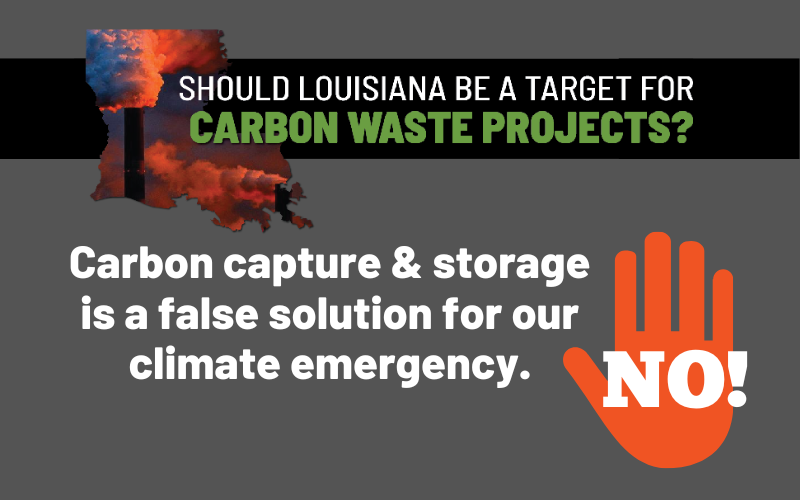
Jun 21, 2023 | Community Engagement News, Dr. Beverly Wright News, DSCEJ General News, Research and Policy News
Jun 21, 2023
New Orleans, LA – Today, Dr. Beverly Wright, Executive Director of the Deep South Center for Environmental Justice (DSCEJ), will testify using the following remarks as prepared for delivery during the EPA’s Public Hearing in opposition to the agency’s proposed approval of Louisiana’s Carbon Capture & Sequestration (CCS) Program.
I am Dr. Beverly Wright, Founder and Executive Director of the Deep South Center for Environmental Justice based in New Orleans, Louisiana. I oppose approval of the Louisiana Department of Natural Resource’s application for primacy to regulate companies that seek to inject carbon dioxide waste underground.
Through education and research, the Center works collaboratively with communities to build their capacity to drive solutions to industrial pollution that harms their health and warms our planet. We have achieved results in strengthening community organizations, improving the health of community members, training 17,000 people for environmental careers with a job placement rate of 91 percent, and moving our state toward an equitable and renewable energy economy. For more than 30 years, we have worked to place equity and justice at the center of environmental, energy, and climate policies. However, after these steps forward, we are now confronted with the possibility of a major step back.
Oil and gas companies are now attempting to push us back and lock us in the continued burning of dirty energy dressed up with carbon capture and storage or CCS for numerous proposed gas plants. They have targeted Louisiana for the underground disposal of their carbon dioxide waste and want to apply to the DNR for permits to do this. Today’s hearing by the EPA is more than whether DNR should have this permitting authority over the Class VI Underground Injection Control Program, it’s about our future.
What will our future be with the approval of a flawed application by the DNR that fails to acknowledge its Constitutional duties as a public trustee include the active and affirmative protection of overburdened communities in Louisiana, who are disproportionately Black, Indigenous and poor and demand environmental justice?
Do we want our future in the hands of the DNR that plans to outsource to unnamed and unknown companies, without any contract terms, the job of managing millions of tons of carbon dioxide waste that can contaminate groundwater sources of drinking water, trigger earthquakes, and migrate above ground through any of the known and unknown unplugged oil and gas wells?
Who wants a future that repeats the past of leaking and broken-down oil and gas wells that are abandoned by companies? This is what we have with state laws that place the burden on the people of Louisiana to pay for and remedy the damage that occurs from carbon dioxide injection wells, and allow companies to walk away from the liabilities imposed by federal regulations.
Our future needs an EPA that will stand with the people of Louisiana who want a healthy and safe place to live for their families and future generations. I call on the EPA to deny the DNR’s application. Furthermore, I request the EPA to re-start this process in order to consider the recent state legislative changes related to carbon dioxide waste injection, and allow for public notice and comment.
Thank you.








